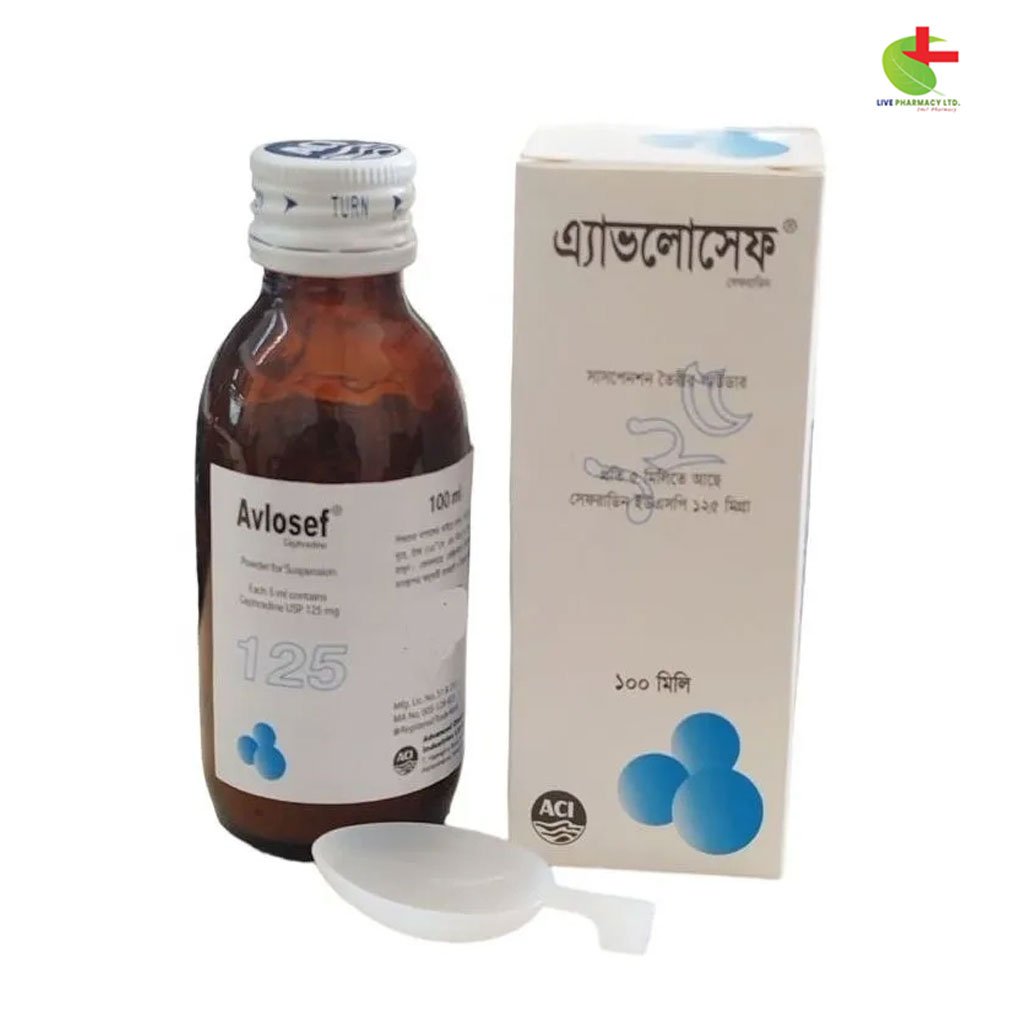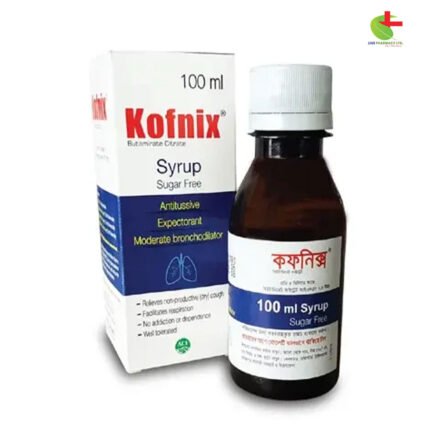Avlosef Powder for Suspension
120.00৳ Bottle (100ml)
- Avlosef is a broad-spectrum antibiotic used to treat infections caused by both Gram-positive and Gram-negative bacteria.
- It is indicated for respiratory, urinary, skin, and soft tissue infections, including those caused by E. coli, Klebsiella, and Staphylococcus.
- The active ingredient, Cephradine, works by inhibiting bacterial cell wall synthesis.
- Avlosef is available in oral and injectable forms, with dosage adjustments for renal impairment.
 Brand
Brand
|
ACI Limited |
|---|---|
 Generics
Generics
|
Cephradine |
 Type
Type
|
Powder for Suspension |
Indications
Avlosef is an effective treatment for infections caused by both Gram-positive and Gram-negative bacteria. These include:
- Upper Respiratory Tract Infections: Sinusitis, pharyngitis, tonsillitis, laryngotracheobronchitis, and otitis media.
- Lower Respiratory Tract Infections: Acute and chronic bronchitis, lobar pneumonia, and bronchopneumonia.
- Urinary Tract Infections: Cystitis, urethritis, and pyelonephritis.
- Skin and Soft Tissue Infections: Abscesses, cellulitis, furunculosis, and impetigo.
Microorganisms Susceptible to Avlosef:
Avlosef is effective against various pathogens, including:
- Gram-positive bacteria: Staphylococci (including penicillin-resistant strains), Streptococci (including Streptococcus pyogenes and Streptococcus pneumoniae).
- Gram-negative bacteria: Escherichia coli, Klebsiella spp., Proteus mirabilis, Haemophilus influenzae, Shigella spp., Salmonella spp., Neisseria spp.
Many strains of E. coli and Staphylococcus aureus that produce penicillinase and are resistant to ampicillin are still susceptible to Avlosef.
Note: Always use Avlosef under the guidance of a registered physician.
Pharmacology
Cephradine, the active ingredient in Avlosef, is a semisynthetic, broad-spectrum, bactericidal antibiotic. It is effective against a range of bacterial infections caused by both Gram-positive and Gram-negative organisms, including those producing penicillinase. The primary mechanism of action of Cephradine is the inhibition of bacterial cell wall synthesis. It disrupts the cross-linking of peptidoglycan, leading to bacterial lysis due to osmotic pressure.
Dosage & Administration
For Oral Administration:
- Adults:
- Urinary Tract Infections: 500 mg four times daily or 1 g twice daily. Higher doses may be required for severe or chronic infections.
- Respiratory Tract Infections: 250-500 mg four times daily or 500 mg to 1 g twice daily, depending on the severity.
- Skin & Soft Tissue Infections: 250-500 mg four times daily or 500 mg to 1 g twice daily.
- Children:
- Total daily dose of 25-50 mg/kg in divided doses. For otitis media, the total daily dose is 75-100 mg/kg in divided doses every 6-12 hours. Maximum dose: 4 g daily.
- Elderly: Standard adult dosing is usually appropriate. Close monitoring is recommended for patients with renal or hepatic impairment.
For Injectable Administration:
- Adults: Usual dose is 2-4 g daily, divided into 4 doses, up to 8 g daily. For prophylaxis, 1-2 g is given preoperatively.
- Children: 50-100 mg/kg daily, divided into 4 doses, up to 300 mg/kg in severe infections.
Drug Interactions
Using Avlosef with nephrotoxic drugs, such as aminoglycosides, may increase the risk of kidney damage. Diuretics and probenecid can also heighten renal toxicity risks.
Contraindications
Avlosef should not be used in patients with a known hypersensitivity to cephalosporins.
Side Effects
Common side effects include gastrointestinal disturbances. Allergic reactions are more likely in individuals with a history of allergies, asthma, or hay fever. Skin reactions, nausea, vomiting, diarrhea, abdominal pain, and dizziness may also occur. Rare effects include liver enzyme disturbances, blood disorders (e.g., thrombocytopenia, anemia), and hyperactivity.
Pregnancy & Lactation
While animal studies have shown no teratogenic effects, safety during pregnancy has not been fully established. Cephradine is excreted in breast milk, so it should be used cautiously in lactating mothers. Patients should be cautious about operating heavy machinery due to potential dizziness.
Precautions & Warnings
- Prolonged use can lead to superinfection caused by resistant organisms.
- Use with caution in patients allergic to penicillins due to the potential for cross-sensitivity.
- False positives for urine glucose may occur with certain testing methods.
- Patients with renal impairment require dosage adjustments.
Storage Conditions
- Suspension: Freshly prepared. Use within 7 days at room temperature or within 14 days when refrigerated.
- Injection: Use within 2 hours at room temperature or within 12 hours if refrigerated.
Keep all medications out of the reach of children and dispose of expired products.













Reviews
There are no reviews yet.